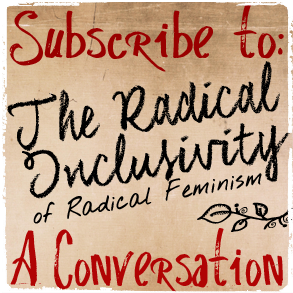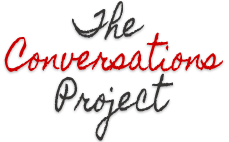Pt. 7, Examining Discursive Nuance: Sex, Gender, and Acculturated Identity
Pt. 6, The Fork in the Road: Sex Class Consciousness vs Biologism, Essentialism, and Identity
March 14, 2016Pt. 8, Discursive Ontology: Feminism, Identity, and Manhood
July 1, 2016Trans Feminist Cristan Williams responds to Radical Feminist John Stoltenberg‘s commentary on sex class consciousness vs biologism, essentialism, and identity by drawing theoretical correlations between Stoltenberg and Monique Wittig. Additionally, Williams requests that Stoltenberg contextualize the terminology within Stoltenberg’s book, Refusing to be a Man.
Keywords: Sex Gender Gender Identity Sex Identity
BY Cristan Williams
@CristanWilliams
 I wanted to next ask you about your understanding, usage and teachings around the concept of “gender identity.” In your crucial work, Refusing to be a Man you use “gender identity” and “sexual identity” to connote perhaps somewhat similar ideas. You contextualize the meaning of “sexual identity” in the introduction to your book thusly: “In this book I interrogate and disavow the identity structure that is manhood, or male sexual identity as I call it here: the official man stuff; the belief that between oneself and female humans there is a definitional divide, a moral and morphological discontinuity, a separation in the species.” Later on, you use both terms within the same paragraph:
I wanted to next ask you about your understanding, usage and teachings around the concept of “gender identity.” In your crucial work, Refusing to be a Man you use “gender identity” and “sexual identity” to connote perhaps somewhat similar ideas. You contextualize the meaning of “sexual identity” in the introduction to your book thusly: “In this book I interrogate and disavow the identity structure that is manhood, or male sexual identity as I call it here: the official man stuff; the belief that between oneself and female humans there is a definitional divide, a moral and morphological discontinuity, a separation in the species.” Later on, you use both terms within the same paragraph:
Now I have delineated the structure of a particular ethic, the ethics of male sexual identity—its value system, its dynamics, its basic scenarios, the way it functions to create male sexual identity out of the ashes of female selflessness. It is the value system in which some acts are deemed “good” and “right” because they serve to make an individual’s idea of maleness real, and others “bad” or “wrong” because they numb it. Having read this far, one may well ask: What is the use? “What is the use?” meaning: It all seems so hopeless. And “What is the use?” meaning: What is the practical value?—what good does it do to know that eroticism, ethics, and gender identity are fundamentally interrelated?
You make the strong and absolutely on-target point that without daring to see that the heteronormative gender contextualizations we socially inhabit culturally define the sex/gender binary identities we culturally embrace, is to abandon the central work of feminism. To fail to recognize that cultural sex/gender contextualizations define that which we assert to be authentically “woman/female” and “man/male” is to miss the point a progenitor of Radical Feminism, Monique Wittig made when she articulated a similar observation:
Colette Guillaumin has shown that before the socioeconomic reality of black slavery, the concept of race did not exist, at least not in its modern meaning, since it was applied to the lineage of families. However, now, race, exactly like sex, is taken as an “immediate given,” a “sensible given,” “physical features,” belonging to a natural order. But what we believe to be a physical and direct perception is only a sophisticated and mythic construction, an “imaginary formation,” which reinterprets physical features (in themselves as neutral as any others but marked by the social system) through the network of relationships in which they are perceived. (They are seen as black, therefore they are black; they are seen as women, therefore, they are women. But before being seen that way, they first had to be made that way.) Lesbians should always remember and acknowledge how “unnatural,” compelling, totally oppressive, and destructive being “woman” was for us in the old days before the women’s liberation movement. It was a political constraint, and those who resisted it were accused of not being “real” women. But then we were proud of it, since in the accusation there was already something like a shadow of victory: the avowal by the oppressor that “woman” is not something that goes without saying, since to be one, one has to be a “real” one.
The ideology of sexual difference functions as censorship in our culture by masking, on the ground of nature, the social opposition between men and women. Masculine/feminine, male/female are the categories which serve to conceal the fact that social differences always belong to an economic, political, ideological order. Every system of domination establishes divisions at the material and economic level. Furthermore, the divisions are abstracted and turned into concepts by the masters, and later on by the slaves when they rebel and start to struggle. The masters explain and justify the established divisions as a result of natural differences. The slaves, when they rebel and start to struggle, read social oppositions into the so-called natural differences. For there is no sex. There is but sex that is oppressed and sex that oppresses. It is oppression that creates sex and not the contrary. The contrary would be to say that sex creates oppression, or to say that the cause (origin) of oppression is to be found in sex itself, in a natural division of the sexes preexisting (or outside of) society. The primacy of difference so constitutes our thought that it prevents turning inward on itself to question itself, no matter how necessary that may be to apprehend the basis of that which precisely constitutes it.
The concepts you address are, in some ways, different from the way “gender identity” is used within the trans community. Would you please expound upon the concepts you’re examining?
What you are reading is a conversation between Cristan Williams and John Stoltenberg that began more than a year ago. In April 2014 John published a personal essay about Andrea Dworkin, his life partner for thirty-one years, titled “Andrea Dworkin Was Not Transphobic.” Cristan happened to read it and had a question for John, which she asked him in the comment thread. Unaware of who Cristan was, John replied. Shortly thereafter Cristan contacted John asking if he would be willing to be interviewed in The TransAdvocate, where she is managing editor. One email led to another and before long the two were writing back and forth in what became a wide-ranging, nearly book-length conversation. After several months, they realized what it was all about: “the radical inclusivity of radical feminism,” a conviction that both Cristan and John deeply share. That conversation, which is ongoing, is being published for the first time in installments on this site.
